- Home
- Barry Eisler
Hard Rain Page 14
Hard Rain Read online
Page 14
“That’s right. The address is Eight-twenty-five. A warehouse with the character for ‘transport’ painted in a big circle on the door. Across from the Lady Crystal Yacht Club. On your right as you walk from the monorail. Should be easy to find.”
“It’s important that you not tell anyone about this,” Washio added. “Only people who are invited get in anyway, and we don’t want trouble from the police.”
Murakami nodded once, acknowledging Washio’s point as though it had been barely worth mentioning. I gathered that Murakami didn’t particularly care who showed up at these things, as long as there was a fight. Washio, on the other hand, was probably responsible for logistics and would be accountable if there were problems.
“Are you fighting?” I asked, looking at Murakami.
For the first time he smiled. The front teeth were overlarge and too even, and I realized he was wearing a cheap dental bridge.
“Sometimes I fight. But not tomorrow,” he said.
I waited to see whether there would be more. There wasn’t.
I briefly considered whether it could be a setup. If they were on to me, though, this was already a pretty perfect venue. They didn’t have to convince me to go somewhere else.
“I’ll be there,” I told him.
Murakami looked at me for a moment longer, the smile lingering, the eyes still flat, then walked away. Washio followed.
I let out a long breath and looked at the clock. When the second hand was at the twelve I attacked the bag again, working off the excess adrenaline Murakami’s presence had provoked.
He was a scary one, no doubt about it. And not just the ruined face. Even without the scarring, I would have recognized him. He exuded the same deadly air I had known, and respected, in Crazy Jake. The external scars were the least of what marked him for what he was.
I wouldn’t want to try to take this guy out with anything less than a scoped rifle. Which is something that’s hard to confuse with expiration by natural causes.
The hell with it, I thought. Risks are one thing. This looks like suicide. If Tatsu wanted him dead that much, I’d recommend a six-man squad and firearms. Much as I would have liked to do something to buy Tatsu’s continued goodwill, this one wasn’t worth it.
I wondered if my old friend would threaten me. I didn’t think so. And if he did, I’d just step up my Rio plans. The preparations weren’t entirely complete, but moving hastily wasn’t a bad option if I found myself caught between a likely suicide mission on the one hand and pressure from Tatsu’s Keisatsucho on the other.
But I’d go to the fight tomorrow and collect whatever intelligence I could. I’d feed it to Tatsu as a consolation prize for my bowing out.
The clock’s second hand swept past the twelve. I unloaded a final flurry of elbow strikes and stepped back. The adrenaline dump was largely depleted, but I still felt tense. Usually a workout helps with that. Not this time.
I found a partner and drilled leg attacks for another hour. After that I stretched and headed for the shower. I was glad this was going to be over soon.
PART TWO
Music reveals a personal past of which, until then, each of us was unaware, moving us to lament misfortunes we never suffered and wrongs we did not commit.
—JORGE LUIS BORGES
9
THAT NIGHT I took a long, wandering walk through Tokyo. I was restless and felt the need to move, to let the city’s currents carry me where they would.
I drifted north from Meguro, keeping to the backstreets, the alleys, the lonely paths through lightless parks.
Something about the damn city continued to draw me, to seduce me. I needed to leave. I wanted to be able to leave. Hell, I’d tried to leave. But here I was again.
Maybe it’s fate.
But I don’t believe in fate. Fate is bullshit.
Then what?
I came to Hikawa Jinja in Hiro, one of the scores of Shinto shrines that dot the city. At perhaps thirty square meters, this shrine is one of the smaller, but by no means the smallest, of these solemn green spaces. I walked through the old stone gate and was instantly enveloped in comforting darkness.
I closed my eyes, tilted my head forward, and inhaled through my nose. I raised my hands before me and extended my fingers like a blind man trying to determine where he has found himself.
It was there, just beyond the limits of ordinary perception. That feeling of the city being alive, coiled and layered and thrumming all around me. And the feeling that I was alive as part of it.
I opened my eyes and lifted my head. The shrine was built on a bluff, and through the trees at its periphery I could see the lights of Hiro, and of Meguro beyond it.
Tokyo is so vast, and can be so cruelly impersonal, that the succor provided by its occasional oasis is sweeter than that of any other place I’ve known. There is the quiet of shrines like Hikawa, inducing a somber sort of reflection that for me has always been the same pitch as the reverberation of a temple chime; the solace of tiny nomiya, neighborhood watering holes, with only two or perhaps four seats facing a bar less than half the length of a door, presided over by an ageless mama-san, who can be soothing or stern, depending on the needs of her customer, an arrangement that dispenses more comfort and understanding than any psychiatrist’s couch; the strangely anonymous camaraderie of yatai and tachinomi, the outdoor eating stalls that serve beer in large mugs and grilled food on skewers, stalls that sprout like wild mushrooms on dark corners and in the shadows of elevated train tracks, the laughter of their patrons diffusing into the night air like little pockets of light against the darkness without.
I moved deeper into the gloom and sat with my back to the honden, the symmetrical, tile-roofed structure that housed the god of this small shrine. I closed my eyes and exhaled, long and complete, then listened, for a while, to the stillness.
When I was a boy I’d gotten caught stealing a chocolate bar from a neighborhood store. The elderly couple that owned the place knew me, of course, and informed my parents. I was terrified of my father’s reaction, and denied everything when he questioned me. He didn’t get angry. He nodded slowly instead, and told me that the most important thing for a man was to acknowledge what he has done, that if he fails to do so he can only be a coward. Did I understand that? he had asked.
At the time, I didn’t really grasp what he meant. But his words induced a burning shame, and I confessed. He took me to the store, where I offered a tearful apology. In the presence of the owners, his visage had been stern, almost wrathful. But as we left, while I continued to weep in my disgrace, he had briefly and awkwardly pulled me to his side, then gently laid his hand on my neck while we walked.
I’ve never forgotten what he told me. I know what I’ve done, and I acknowledge all of it.
My first personal kill was of a Viet Cong near the Xe Kong River, the Laotian border. In Vietnam it was called a “personal kill” when you killed a specific individual with a direct-fire weapon and were certain of having done it yourself. I was seventeen at the time.
I was part of a three-man recon team. The teams were small, and depended for success and survival on their ability to operate undetected behind enemy lines. So only men with the ability to move with absolute stealth were selected for recon. The missions required ghosts more than they required killers.
It happened at daybreak. I remember the way I could just make out the mist rising off the wet ground as light crept into the sky. I always thought it was a beautiful country. A lot of soldiers hated it because they hated having to be there, but I didn’t feel that way.
We’d been in the field for two nights with no contact and were heading to the extract point when we saw this guy, alone, standing in a clearing. We froze and watched him from just inside the tree line. He was carrying an AK, so we knew he was VC. He was pacing, looking left, then right. He seemed to be trying to orient himself. I remember wondering whether maybe he’d gotten separated from his unit. He looked a little scared.
Our g
uidelines were to avoid contact, but our mandate was to collect intelligence, and we saw that he was carrying a large book. Some kind of ledger. It might be a nice prize. We looked at each other. The team leader nodded at me.
I knelt and brought up my CAR-15, finding the VC in the sights, waiting for a pause in the pacing.
A few seconds passed. I knew I had time and wanted to be sure of the shot.
He knelt and set down his rifle and the book. Then he stood, opened his pants, and pissed. Steam rose from where the hot liquid hit the earth. I kept him in my sights, thinking the whole time that he had no idea what was coming and that this was a fucked-up way to die.
I let him finish and get himself back in his pants. Then, ka-pop! I dropped him. I saw him go down. I had this feeling of incredible elation, that I’d succeeded! I’d won! I was good at this!
We went over to where he lay. When we got there, I was surprised to see he was still alive. I’d hit him in the sternum and he had a sucking chest wound. He’d fallen on his back and his legs were splayed out. The ground underneath him was already dark with his blood.
I remember being struck by how young he was. He looked my age. I remember that thought shooting through my mind—God, same as me!—as we stood in a circle around him, not knowing what to do.
He was blinking rapidly, his eyes jumping from one face to another and then back again. They stopped on mine, and I thought it was because he knew I was the one who shot him. Later, I realized the explanation was likely more prosaic. He was probably just trying to make sense of my Asian features.
Someone undid a canteen and extended it to him. But he made no move to take it. His breathing became faster and shallower. Tears spilled out of the corners of his eyes and he mumbled words in a high, strained voice that none of us could understand. I learned later that battlefield wounded and dying often call out to their mothers. He might have been doing that.
We watched him. The chest wound stopped sucking. The blinking stopped, too. His head settled into the wet ground at an odd angle, as though he was listening to something.
We stood around him silently. The initial sense of elation was gone, replaced with a weirdly intimate tenderness, and a horrified sadness so sudden and heavy that it actually made me groan.
Same as me, I thought again. He didn’t look like a bad guy. I knew that in some other universe we wouldn’t have been trying to kill each other. Maybe we would have been friends. He wouldn’t be lying dead on a jungle floor saturated with his own blood.
One of the men I was with started to cry. The other began moaning Oh Jesus, oh Jesus, over and over again. Both of them vomited.
I did not.
We took the ledger. It turned out to contain some fairly useful information about VC payments to local village heads and other attempts to buy influence. Although of course, in the end, none of that had mattered.
Someone on the Huey that picked us up afterward laughed and told me I’d popped my cherry. No one talked about how it really felt, or what had happened while we stood in a silent circle and watched the man die.
When the army was assessing my suitability for the joint Special Forces–CIA program known as SOG, the psychiatrist had displayed a keen interest in that initial killing experience. He seemed to think it was noteworthy that I hadn’t vomited. And that what he described as my “associated negative emotions” had dissipated. No bad dreams afterward, that was also considered a plus.
Later, I learned that I was categorized as belonging to a magical two percent of military men who are capable of killing repeatedly, without hesitation, without special conditioning, without regret. I don’t know if I really belonged there. It wasn’t as easy for me as it was for Crazy Jake. But that’s where they put me.
The average person is surprised at the extent to which a soldier has to deal with hesitation before the fact and regret afterward. Of course, the average person has never been required to kill a stranger at close range.
Men who have survived close-quarters killing know that humans are possessed of a deep-seated, innate reluctance to kill their own species. I believe there are evolutionary explanations for the existence of this reluctance, but that doesn’t really matter. What matters is that the fundamental purpose of basic training for most soldiers is to employ classical and operant conditioning techniques to suppress the reluctance. I know that modern training accomplishes this objective with ruthless effectiveness. I also know that the training deals better with the reluctance than it does with the regret.
I sat for a long time, picking through memories. Eventually I started to get cold. I went back to the hotel, watching my back as always along the way. I took an excruciatingly hot bath, then slipped into one of the cotton yukata the hotel had thoughtfully provided. I pulled a chair in front of the window and sat in the dark, watching the traffic moving along Hibiya-dori, twenty floors below. I thought of Midori. I wondered what she might be doing at that very instant on the other side of the world.
When the traffic began to thin, I got in bed. Sleep came slowly. I dreamed of Rio. It felt far away.
10
THE NEXT NIGHT I ran an SDR as usual on my way to the fight. When I was confident I was clean, I caught a cab to the Tennozu monorail station. From there I walked.
It was cooler here by the water. A sidewalk was being repaired, and a cluster of temporary signs advising anzen daiichi!—Safety First!—swayed stiffly in the wind, squealing like lunatic chimes. I moved across the rust-colored bulk of the Higashi Shinagawa Bridge. Around me was a network of massive train and automobile overpasses, their concrete darkened by the accumulated years of diesel fumes, their bulk so densely woven against the dark sky that the earth beneath felt vaguely subterranean. A solitary vending machine sat slumped on a street corner, its fluorescent light guttering like a dying SOS.
I spotted the Lady Crystal Yacht Club, probably an advertising euphemism for a restaurant that happened to be located on the water, and turned left. To my right was another overpass with warehouses beneath; opposite, a small parking lot, mostly empty. Beyond that, another Stygian canal.
I found the warehouse door Murakami had described. It was flanked by a pair of concrete flowerpots choked with weeds. A metal sign to the left warned of fire danger. Rust ran down the wall from behind it like dried blood from a peeling bandage.
I looked around. Across the water were brightly lit high-rise office buildings, apartments, and hotels, the names of their owners proudly glowing in red and blue neon: JAL, JTB, the Dai-ichi Seafort. It was as though the ground around me was poisoned and incapable of supporting the growth of such structures here.
To my left was an indentation in the long line of warehouses. I stepped inside and spotted a door on the right, hidden from the street outside. There was a small peephole at eye level. I knocked and waited.
I heard a bolt being moved back, then the door opened. It was Washio. “You’re early,” he said.
I shrugged. I rarely make appointments. You don’t want to give someone the opportunity to fix you in time and place. On those infrequent occasions where I have no choice, I like to show up early to scout around. If someone’s going to throw me a party, I’ll get there before the musicians set up.
I glanced inside. I was looking at a cavernous room dotted with concrete pillars. Incandescent lights dangled from a ceiling eight meters up, their bulbs encased in wire. Cardboard boxes were stacked five meters high on all sides. Two forklifts rested against a wall, looking like toys in relation to the space around them. A couple of chinpira in black T-shirts were moving chairs to the edges of the room. Other than that we were alone.
I looked at Washio. “Is it a problem?”
He shrugged. “Doesn’t matter. People will be here soon enough.”
I stepped inside. “You work the door?”
He nodded. “I don’t know your face, you don’t get in.”
“Who’s fighting?”
“Don’t know. I just run the fights, I don’t promote them.
”
I smiled at him. “You ever participate?”
He laughed. “No. I’m a little old for this shit. Maybe I would have when I was younger. But these fights have only been going on for a year, year and a half, which is long after my prime.”
I thought of the way I’d seen him talking to Murakami, as though he’d been delivering a briefing. “The people at the club,” I said, “you’re training them for these fights?”
“Some of them.”
“What about Murakami?” I asked.
“What about him?”
“What does he do?”
He shrugged. “A lot of things. Some of the guys he trains. Sometimes he fights. We get a good turnout when he’s fighting.”
“Why?”
“Murakami always finishes his fights. People like that.”
“ ‘Finishes’ them?”
“You know what I mean. When Murakami fights, for sure one of the fighters is going to die. And Murakami has never lost.”
I had no trouble believing that. “What makes him so good?” I asked.
He looked at me. “Let’s hope you never have to find out.”
“Is it true he fights dogs?”
He paused. “Where did you hear that?”
I shrugged. “Just talk.”
Another pause. Then: “I don’t know whether it’s true. I know he goes to underground dogfights. He’s a breeder. Tosas and American pit bulls. His dogs are dead game, too. He feeds them gunpowder, pumps them full of steroids. They get irritated at the world and aggressive as hell. One dog, Murakami shoved a jalapeño pepper up its ass. Fought like a demon after that.”

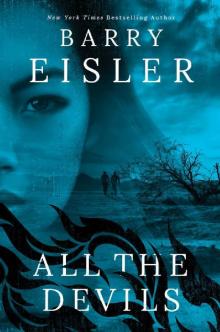 All the Devils
All the Devils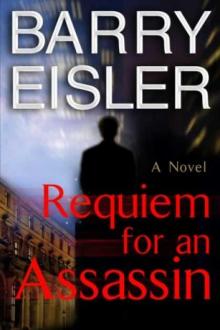 Requiem for an Assassin
Requiem for an Assassin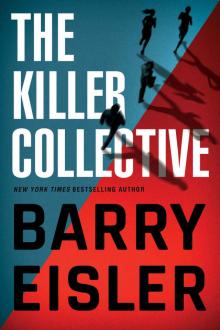 The Killer Collective
The Killer Collective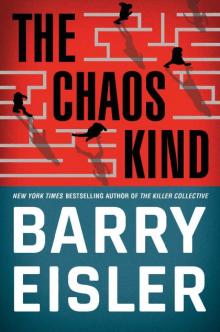 The Chaos Kind
The Chaos Kind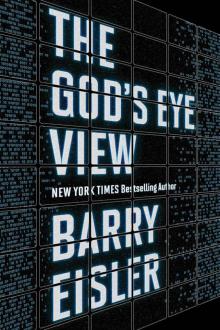 The God's Eye View
The God's Eye View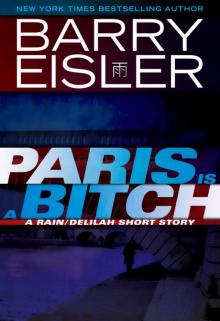 Paris is a Bitch
Paris is a Bitch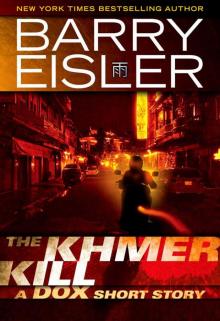 The Khmer Kill: A Dox Short Story (Kindle Single)
The Khmer Kill: A Dox Short Story (Kindle Single)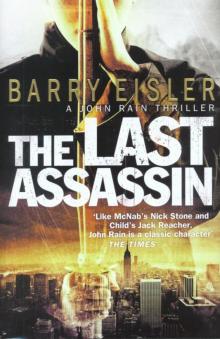 The Last Assassin
The Last Assassin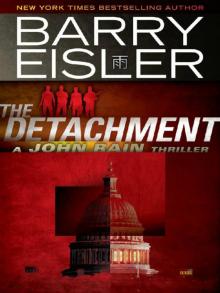 The Detachment
The Detachment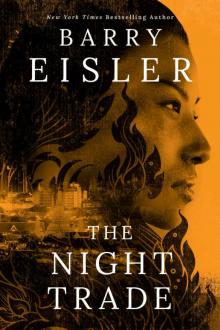 The Night Trade (A Livia Lone Novel Book 2)
The Night Trade (A Livia Lone Novel Book 2)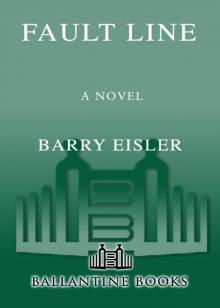 Fault Line
Fault Line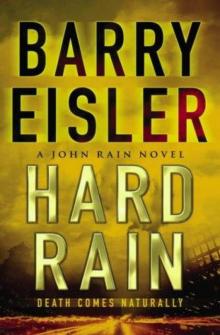 Hard Rain
Hard Rain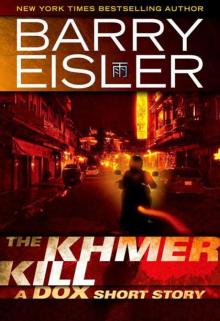 The Khmer Kill_A Dox Short Story
The Khmer Kill_A Dox Short Story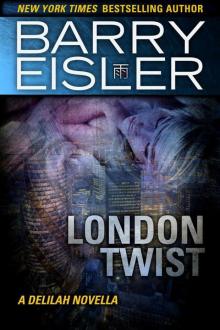 London Twist: A Delilah Novella
London Twist: A Delilah Novella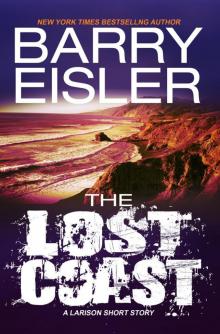 The Lost Coast
The Lost Coast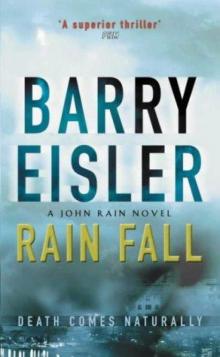 Rain Fall
Rain Fall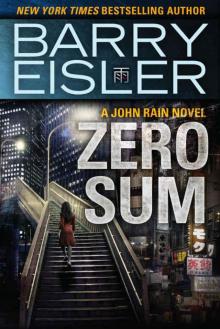 Zero Sum
Zero Sum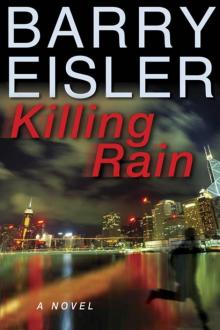 Killing Rain
Killing Rain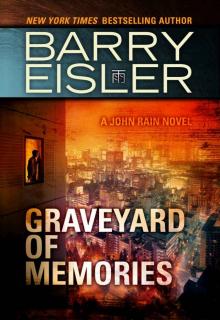 John Rain 08: Graveyard of Memories
John Rain 08: Graveyard of Memories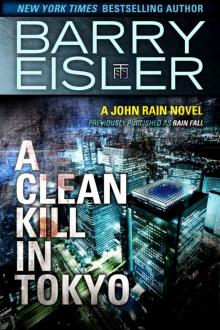 A Clean Kill in Tokyo (previously published as Rain Fall)
A Clean Kill in Tokyo (previously published as Rain Fall) Inside Out: A novel
Inside Out: A novel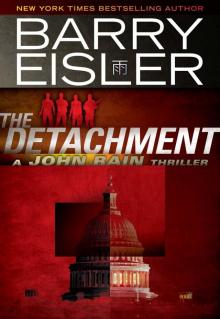 John Rain 07 - The Detachment
John Rain 07 - The Detachment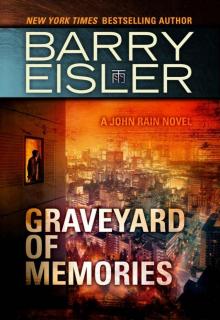 Graveyard of Memories
Graveyard of Memories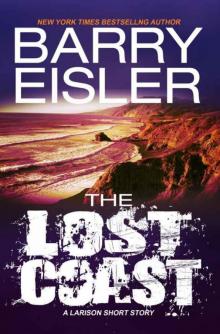 The Lost Coast -- A Larison Short Story
The Lost Coast -- A Larison Short Story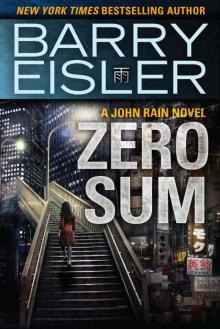 Zero Sum (A John Rain Novel)
Zero Sum (A John Rain Novel)